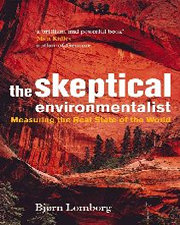December 15, 2004
12/15 - THE GOSSIP: Is Crichton off the mark with "State of Fear"?
On the subject of the Crichton book (which today got a favorable review in USA Today), I just had a long chat with an old scientist friend who works in climate change and just returned from Antarctica. Here is his up-to-the-minute scoop on how he sees the climate change issue today.
THERE'S NO DOUBTING there remains a great deal of uncertainty in understanding and predicting change in the global climate (which is what Crichton is taking advantage of with his novel). The first big thing my friend mentions is that we have been in a 10,000 year period of relative stability for the climate. For hundreds of years previous the climate bounced all over the place and hominids ran around in fear. For reasons unknown, everything settled down 10,000 years ago and has been pretty stable. But that could be ending, for reasons unknown.
THERE'S NO DOUBTING there's a major warming trend occurring on the planet. Crichton says in his novel that only 2% of Antarctica is getting warmer while the continent as a whole is getting colder. My friend has no major problem with that statement. He says there are some major glacier decline events occurring in "East Antarctica" (the area around Palmer Peninsula), but the entire of "West Antarctica" (the bigger other piece of the continent) is actually very stable and
probably getting a little colder.
On the other hand, THERE'S NO DOUBTING that 40% of the ice at the North Pole has vanished.
Furthermore, a recent paper in Nature reported that over the course of the past 700,000 years (data from new ice cores that provide the longest record ever) the correlation between temperature and carbon dioxide levels is extremely tight. However, no one can still decide this chicken-or-egg problem of which causes which.
But THERE'S NO DOUBTING that carbon dioxide levels have risen steadily since the 1950's, meaning we are definitely conducting an experiment like nothing ever before.
He also mentions there is good reason to have a fair amount of confidence in the scientific establishment's ability to deal with major global problems, based on what happened with the Ozone Hole problem discovered 20 years ago. A number of international accords, such as the Montreal Accord, directly addressed the problem, hugely reduced therelease of CFC's, and as a result, though the hole is still up there, it appears to have been a crisis averted. A recent paper projected how things would be today if not for those accords -- it would be a genuine catastrophe.
And lastly, a personal note on Crichton. He has done a lot to make science fun, but at heart, he lacks a fundamental understanding of human nature. You can read this in the critiques of his books. You can read it in the books themselves which are made up of stick figure characters. Understanding the current questions swirling around climate change requires an understanding of one key word, VARIATION.
It is a complex concept, and one that he does not seem to be comfortable with. Which is why his current attacks on environmentalism focus on the QUANTITATIVE side of environmental problems (the hard numbers that he is comfortable with), but show little grasp of the QUALITATIVE side (i.e. biology). And these are exactly the same problems that his buddy Bjorn Lomborg ("The Skeptical Environmentalist") whom he now so vigorously defends, suffers from.

What drew Crichton into the fray: when 6 prominent scientists attacked "The Skeptical Environmentalist" in Scientific American, Crichton compared it to the heresy trials of Galileo.